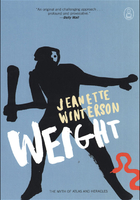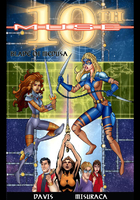Griffin told Jan to get Mary Netter. After a moment she told him that Mary was in a meeting. Griffin said it was important, Jan put him on hold, and in a few seconds Mary got on the line.
"What's up? I'm in a meeting."
"I've got a question. How long do you have to wait before you've waited long enough?"
"Is this a plot point?"
"Yes."
"What are we waiting for?"
"This is an etiquette problem, a thank-you letter. How long do you wait for one?"
"Someone sends a gift, she doesn't get a thank-you note and she gets really steamed?"
"He. And he gets mad enough to pick a fight."
"A man is getting this angry? This is a comedy, no?"
"It's just an idea right now."
"If this isn't a comedy, a man shouldn't get that angry. You're describing indignation, which is not for heroes of movies. Whose idea is this?"
"Forget the film for a minute. How long would you wait before you'd waited long enough?"
"When I give a gift to someone and the gift and the person are special to me, I get very excited every time I imagine the person unwrapping the box. If it's for a girl, I think about her saving the ribbon, because I save the ribbon. So, if you've sent the gift by mail, or even if you had the store deliver it, how long does that take? Three days local, a week to New York? If you send something nice and you don't hear back within two weeks, you have a right to be really angry—if they got the gift, of course—unless they got run over by a truck. You imagine your friend with this precious thing and he's enjoying it, but he's not responding. Maybe he hated it. He doesn't know what to say about it. Is that possible?"
"Very possible."
"Well, you think that he hates it, which is just as bad. So you start to resent him, and then you wish you hadn't sent the gift. Maybe it was too extravagant and the person who got it doesn't know what to say, maybe you overestimated the friendship, maybe it's only in your mind. You've sent something valuable, and the person who got it didn't really like you before, and now he's even a little scared of you because only a lunatic would be so generous to a casual acquaintance. Anyway, if the person who sent the gift is really quite proper, then he'd be angry in two weeks. If he brooded a lot, he'd be ready to kill in four or five weeks."
"Who said anything about killing?"
"It's funnier if he wants to kill. This is a comedy, no?"
"You can tell me when you read it, when it's finished."
They said good-bye. Griffin thought that she might have lied about being in a meeting, because she had talked for such a long time without apologizing to anyone in the room. Maybe she had signaled with her hands, like a referee, time out, or maybe she had just talked on while someone in the office sat dumbly, trying to read a memo or a magazine on the coffee table. Maybe she was flattered that he had called her and she didn't want to lose what he was saying, so she ignored, as a matter of survival, that which was not essential, and what was not essential included whomever she had in her office. In that case, if she dropped a meeting for him, then he had not lost too much power at the studio, and Larry Levy would have to fight Griffin's partisans.
Griffin turned the calendar back six weeks. He wished he had asked how long someone might hold a grudge before forgetting about it. A year? Six months? How much hope had he given the Writer? What if the idea the Writer pitched was a comedy and the Writer had made Griffin laugh a few times, or what if the Writer had described a scene that reminded Griffin of his own childhood and he had said so? In either case, the Writer would have gone home and called his agent and described the meeting as the best of his life, because he had made Griffin Mill laugh or cry. He could have been so rapturous that he'd have called his agent from a pay phone on the lot and then, on his way home, stopped at a car dealer and asked for the price of convertibles. Maybe he took a few friends to dinner that night, that's how confident he was of the impending deal, behaving with the guileless generosity of someone who always has a wallet full of twenty-dollar bills.
If the meeting had been early in the week, the Writer might have expected a call from Griffin before the weekend, but his agent would have cautioned him to let a solid week pass, to give Griffin a chance to talk it over with Levison. When had the Writer realized the bad news? Monday afternoon? Had he stayed by the phone at all? Had he checked and rechecked his answering machine? Had he bothered his agent, or his agent's secretary, calling before lunch and then right after lunch to see if Griffin had started the process for making a deal? And then Monday night, and no call. And then Tuesday. More hope on Tuesday. Happiness on Tuesday, confidence on Tuesday. And no call from Griffin on Tuesday. And by the weekend? The agent had told the Writer to face the truth. And did the Writer then fight with his agent? Did the agent tell the Writer he had spoken to Griffin and that Griffin was passing on the project? That was likely. The agent would have known not to call him. Or else he had called, and Griffin hadn't returned that call, and the agent knew to let go, not to make himself a pest. And how long before the Writer wanted to murder?
Griffin was scared. This was not a hypothetical situation. This was not a practical joke. He believed the Writer. He believed that the Writer wanted to kill him. It made sense.
The phone rang. Jan said, "Witcover." A producer. Griffin took the call, and immediately Witcover started to scream at him about the studio's charges for an overseas distribution fee on a picture he had made three years ago.
"That's not my picture," said Griffin. "Who was the exec?"
"Susan Alper, and she's at MGM now, Griffin."
"I'm not in charge of distribution. Why are you calling me?"
"You're supposed to be my friend."
"Then why are you yelling at me?"
"It's how I do business."
"There's something else going on, what is it? You're holding something back from me, I can hear it in your voice."
"Okay. Because you're a fucking executive, Griffin, you're a corporation man, you're not a moviemaker, you're not a showman. I've made five movies. Have you ever read an article in a newspaper and then found a writer and worked on the story together? I mean, all the way from day one to setting it up at a studio, and then finding a director, and then finding a star, and then getting it made, and staying up for postproduction, and then going to a preview in fucking Denver, Colorado, and seen your movie, with your name, on the big screen? Have you, you little shit? A three-line idea from a newspaper, and two years later you take home three million dollars after taxes? A three-line idea and you take it all the way to cable and cassette? Have you ever done that? It's easy to buy things, Griffin. Why don't you come outside and try to sell something?"
"I'm in a meeting right now. Why are you saying all this to me?"
"Because I'm rich, because I don't give a shit. Because you said you liked Gossip but you didn't fight for it, and it's in turnaround now, and guess what, I set it up with Susan Alper. So fuck you. That's right. You're history, Griffin." And then Griffin held the phone for no reason, because no one was on the line.
He would need a complete list of everyone he had seen in the last year, would need their phone numbers. Everything was in Jan's desk; she kept phone numbers in the calendar in case meetings had to be canceled. He could ask for it, but he had no excuse. This year's was on her desk. Last year's was probably in a file cabinet. He could send her away, he thought, but if he told her to pick up a story synopsis from the files on another floor, someone might come into the office and find him rummaging around. He would have to wait until night. He often worked until eight or nine. It would be easy to find the calendars.
His own calendar told him that he was having dinner with Bonnie Sherow. He flipped backward through the months; her name appeared at least every other week. She was a production vice president at Paramount. Griffin had taken her to Mexico, to Cabo San Lucas, for three days, soon after they met, and they talked about moving in with each other. When they decided not to, admitting defeat to convenience, Griffin saw for a moment, in the light of that resignation, that they had been in love. By then it was too late. For a while he thought she was in love with someone new, or testing a possibility, but if she had been, it was over. It had just been a feeling. She never mentioned anyone. He thought she might have been seeing someone who was married, someone at work.
He called her. "I have to cancel tonight."
"I'm sorry."
"I'm the one who's supposed to apologize. Anyway, we've got the Motion Picture Home thing coming up, we'll be together then." Griffin offered this without conviction. They'd made the date months ago. Did she care anymore?
"I'm in a meeting now. Call me tomorrow."
Griffin wanted to rush down the hall and look for a meeting so he could tell everyone in the room about the frightful postcards. Would they comfort him or laugh? The impulse to share his terror brought on a rush of humiliation; he would have felt like the child who calls the teacher "Mommy."
He told Jan to get Larry Levy, who took the call immediately.
"Congratulations," said Griffin, "I just heard the good news."
"I'm looking forward to this, I really am. We're going to have fun, we're going to make some good movies, and we're going to make some money."
"We should have lunch."
"Tomorrow. I'll cancel mine if you'll cancel yours." It was understood that they both had scheduled lunches.
"Done," said Griffin. "Clint Eastwood I can always see."
Griffin's little joke had cost him the first round. They both knew he wouldn't cancel Clint Eastwood. They both knew he wouldn't have lunch with Eastwood unless Levison were there.
Jan buzzed him, this time Sandra Kinroy, an agent, wanted to set up a meeting with a new client. "Has he had anything produced?" asked Griffin.
Kinroy sighed. "Read the script, Griffin."
"Would I want to make this movie?"
"I'd like to see it."
"Then I know I wouldn't want to make it."
"I hear Larry Levy is coming over."
"And you're wondering if you should even bother setting up meetings with me, is that it?"
"Will you read the script? It's a lovely script, he's a lovely man, and you'd do me the favor of a lifetime if you'd read the script yourself. Don't wait for the coverage."
"So there's coverage at other studios and they don't like it."
"Just give this one a chance, Griffin, for me."
She was nothing to him, she had no claim on his obligations, he could have said so, but what was the advantage of a fight with her over nothing? "Send it over." She thanked him. Of course, she knew that he would have it covered first. Each studio sent all submitted scripts to readers, who broke the stories down, described them briefly, and either recommended them or trashed them. Mostly they trashed them. Griffin had started as a script reader. If the script scored well, Griffin would take it home for the weekend and start it. Maybe he would finish it.
When he put the phone down, Griffin contemplated the end to his panic. He closed his eyes and concentrated once again on the postcard Writer. He wanted to talk out loud but worried that someone might hear him. He said, silently, I'm going to choose a writer at random and get back to him and apologize. If that writer accepts my apology, then so should you. And more than that, I will read the script Sandra sends me, I will meet the writer, and if he has any good ideas, I will consider them seriously, and no matter what, I will get back to him.
Now he had a plan. For the next hour and a half he read budget reports and story synopses. Doing his job, he was happy. When Jan said good-bye for the day, he waited until he knew she was gone too long to return for anything she might have left, although nothing near her desk looked like she would want it overnight. Then he closed the door to the hall.
Last year's calendar was in her desk. He took it back to his office and set it next to this year's. So many meetings, so many names, Griffin envied this person who was so busy. Some names were repeated three or four times, and then they disappeared; others were there every day for a week, others only once, some once a week for a year. Producers. Directors. Griffin started to make a list of the one-timers, because they were the writers who had pitched and lost. He closed the book. He didn't want to call someone he hadn't seen in ten months. It would be transparently bizarre.
Should he choose a name at random? Type all the names on individual cards and pull one from the pile? He turned to September, when the temperature had stayed over a hundred for two weeks and the Writer might have interpreted the comfort he felt in Griffin's office as a sign that he and the executive got along well, instead of recognizing the air conditioner as the source of this good feeling. One moment sweating in the parking lot, and a few minutes later cool in Griffin's office, wondering why he had worried so much. On the twenty-first Griffin had seen two writers, Andrea Chalfin at ten in the morning and David Kahane at three-thirty. Andrea Chalfin was directing a movie in Colorado now. She was too busy to send postcards.
This is perfect, thought Griffin. I don't remember Kahane's name, face, or idea. He dialed Kahane's number. This was going to be easy. A woman answered.
"Is David there?"
"No."
"Oh." Griffin didn't know what else to say. "This is Griffin Mill."
"Now it's my turn to say 'oh.'" She knew who he was.
"I promised David I'd get back to him."
"I didn't know he'd seen you."
"Well, it's been a while."
"Do you always work until seven-thirty?"
"Sometimes until ten. How late does David work?"
"I don't think I should give away trade secrets. He'd kill me if I told you that."
"Is he the violent type?"
"Like all writers, he gets drunk before dinner and throws his empty vodka bottles at my head."
"Who are you?"
"June Mercator."
"And what do you do?"
"Babysit writers. No. I'm not in the biz at all. I'm an art director for Wells Fargo."
"That's show biz of a sort."
"Paste-ups of interest-rate brochures is show business?"
"You have to make the public happy."
"I have to catch their attention. And most of what I do is seen by people who are already customers. I don't do advertising."
"So David went to the movies tonight?"
"This is Los Angeles. If you don't like rock and roll, what else is there to do?"
"Do you go to the movies much?"
"I used to go with David all the time. I stopped."
"Why?"
"They all end the same way. There's either a chase, a contest, or revenge."
"What if there's love?"
"Someone gets hurt."
"What about comedies?"
"Only if they're really stupid."
"What movie did David go to see tonight?"
"The Bicycle Thief."
"Why didn't you go?"
"I've seen it."
"Is it good?"
"You've never seen it? Shame on you."
He didn't say anything immediately, and in the silence that followed he imagined her waiting for him to say a lot more, why he called, what he wanted, more questions about her, forgetting David. They were on the line silently for too long, and they both hung up.
Griffin found the movie page from that day's paper and looked for The Bicycle Thief. It was playing at only one theater, the Rialto in Pasadena.
What if Kahane wasn't there, what if he knew the movie well enough to lie about it to June and use the film as an alibi while he was in bed with someone else? Was June suspicious? Griffin thought he had detected a twang of incredulity in her voice after he had said his name. The effect of his fame never failed to impress him.
It was after seven, the movie had started. It wouldn't take long to drive to Pasadena.
No one knew where he was going. No one was following him. He realized he didn't even have to find David Kahane. He could go wherever he wanted. Choosing to find David, he felt close to the postcard Writer. And so far he couldn't say that Kahane was not the postcard Writer.
On the Pasadena Freeway, Griffin rehearsed his meeting with David Kahane. He would offer his hand, they'd trade comments on the film, and then Griffin would say, "By the way, I'm really sorry I didn't get back to you. It was a good idea, but I'm afraid that Levison is a little more conservative than he should be. Have you had any luck with it at another studio?" He would ask if David wanted to bring in any other ideas or show him a script he might be working on. He could invite David and June to a party, an afternoon barbecue where they could meet other executives and producers. If David was his guest, he knew, everyone at the party would assume he deserved to be there on the strength of something impressive he'd written, since he hadn't had anything produced. He would be invited to meetings. He even might be offered an assignment, sent a script that needed a rewrite, or receive an advance copy of a book, hand-delivered, for his comments. This would save him the struggle of pumping something from his imagination, depleted by too many bewildering meetings.
Griffin hoped David Kahane was smart about money, because he was going to start making lots of it. Griffin would tell his world, "This guy's okay." He worried about how to start his conversation with Kahane. He would ask him if he lived in Pasadena; the question was so wrong, it would make Griffin seem harmless and innocent. He knew where David lived, he had a Hollywood phone number.
He parked on the street a block past the theater. The movie would be over in twenty minutes; he could stand in front of the theater and catch David Kahane on his way out, saving himself a few dollars. He felt the Writer looking over his shoulder, or over his conscience's shoulder, making a clucking noise, as if to say, "Don't cheat. You owe me whatever it costs."
As he paid for the ticket, he wanted to tell the man in the booth that this was the first time he had spent money to see a movie in a few years, probably two years, since he had been stranded in Denver waiting for a plane and he'd had an afternoon to kill. This urge to tell such a pointless anecdote to a stranger embarrassed him so much that he went straight into the theater, skipping the refreshment stand, even though he wanted popcorn. He was hungry. He took a seat in the middle of the back row, between the two doors. He hoped this wasn't one of those theaters where the lights don't go up when the movie is over, because David Kahane, if he was sitting toward the front, could just as easily leave through one of the exits near the screen, and then Griffin might miss him.















